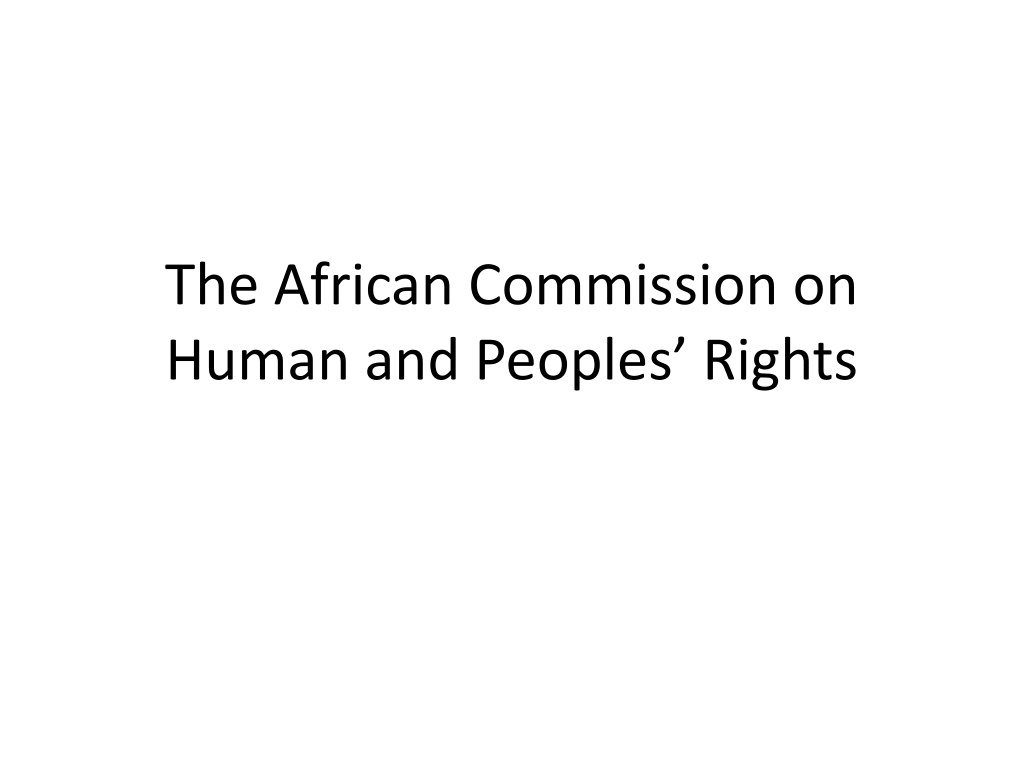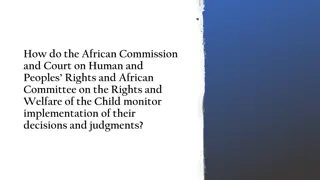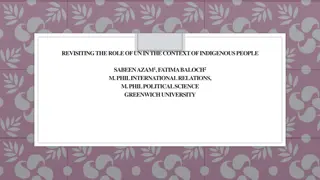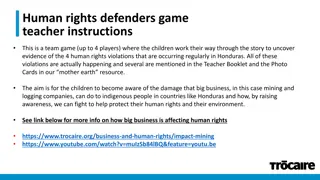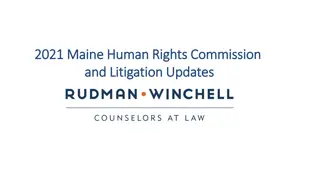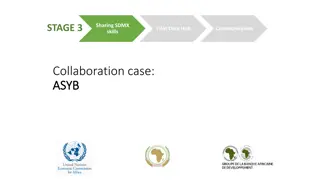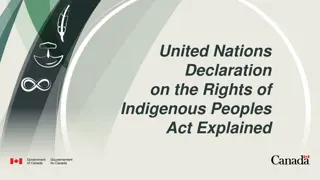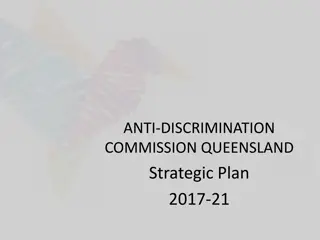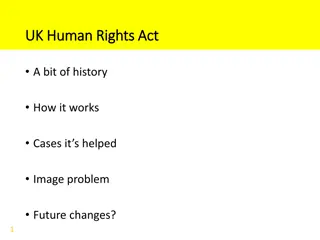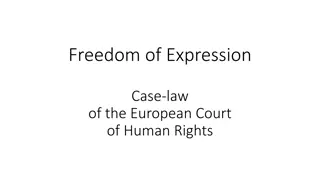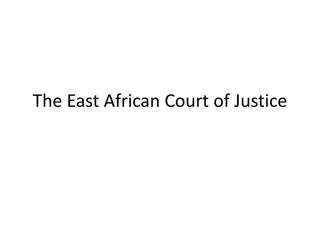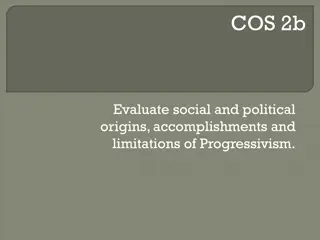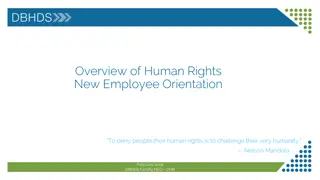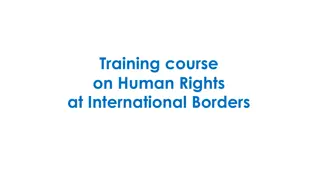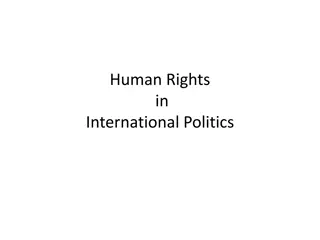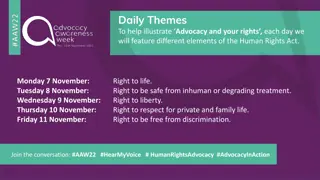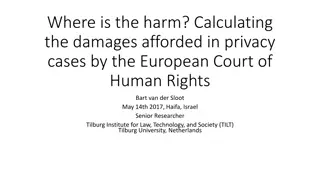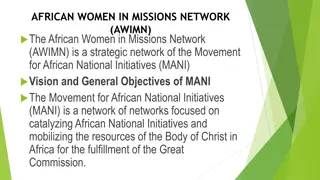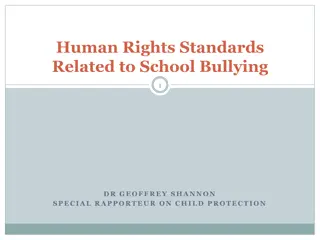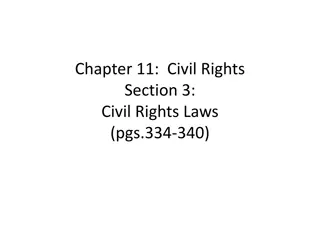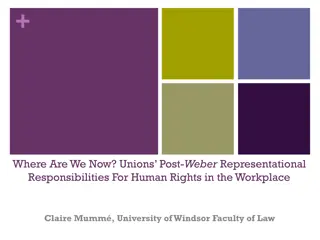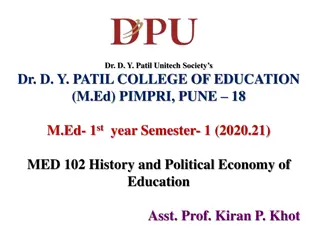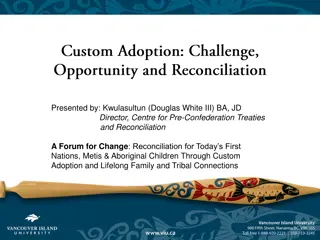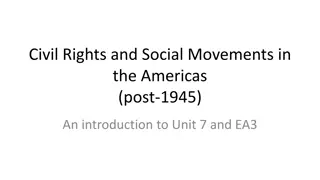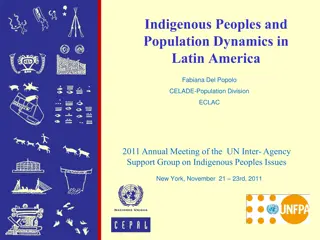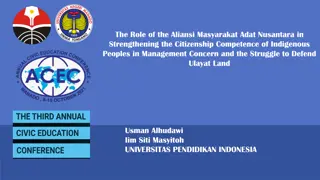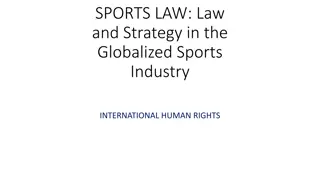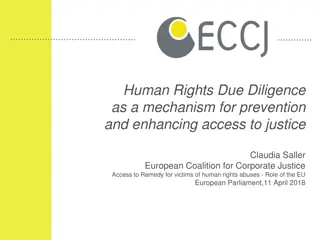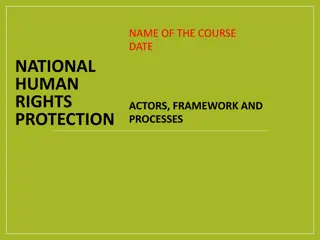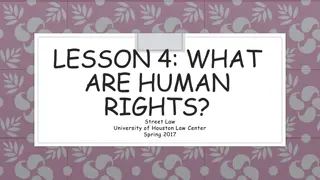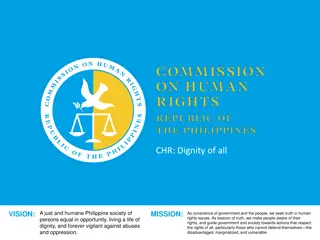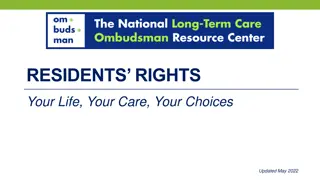Overview of the African Commission on Human and Peoples' Rights
The African Commission on Human and Peoples' Rights was established to promote and protect human rights across Africa. The African Charter, which entered into force in 1986, emphasizes civil and political rights, including freedom from discrimination, equality, life, personal integrity, and various freedoms such as religion, information, and political participation. The Charter also recognizes the rights and duties of individuals and communities, with protocols and statements expanding on these rights.
Download Presentation

Please find below an Image/Link to download the presentation.
The content on the website is provided AS IS for your information and personal use only. It may not be sold, licensed, or shared on other websites without obtaining consent from the author. Download presentation by click this link. If you encounter any issues during the download, it is possible that the publisher has removed the file from their server.
E N D
Presentation Transcript
The African Commission on Human and Peoples Rights
The African Charter Entered into force on 21 October 1986 Aims to reflect the historical tradition and values of African civilization (Preamble) Unique features: Recognises rights of peoples, such as rights of all peoples to self-determination and right of peoples to freely dispose of natural wealth Emphasises the duties of individuals towards the community and state Gives people fleeing persecution the right to obtain asylum (and not just to seek it)
Civil and Political Rights The majority of universally accepted civil and political rights are contained in the Charter: freedom from discrimination (Articles 2 and 18(3)) equality (Article 3) life and personal integrity (Article 4) freedom from slavery (Article 5) freedom from cruel, inhuman or degrading treatment or punishment (Article 5) rights to due process concerning arrest and detention (Article 6) right to a fair trial (Articles 7 and 25)
Civil and Political Rights freedom of religion (Article 8) freedom of information and expression (Article 9) freedom of association (Article 10) freedom of assembly (Article 11) freedom of movement (Article 12) freedom of political participation (Article 13) the right to property (Article 14)
Protocols that Expand the Charter Rights Protocol to the African Charter on Human and Peoples Rights on the Rights of Women in Africa (2005) African Union Convention on Prevention and Combating Corruption (2003) African Charter on the Rights and Welfare of the Child (1999)
Statements that Expand the Charter Rights Principles and Guidelines on the Right to a Fair Trial and Legal Assistance in Africa (2003) Declaration of Principles on Freedom of Expression in Africa (2002) Guidelines and Measures for the Prohibition and Prevention of Torture, Cruel, Inhuman or Degrading Treatment or Punishment in Africa (Robben Island Guidelines) (2002) Principles and Guidelines on Economic, Social and Cultural Rights (2010)
Other International Law and Principles The Commission shall draw inspiration from international law and peoples rights (Article 60) The Commission shall take into consideration other general or special international conventions (Article 61)
Claw-back clauses Sir Dawda K. Jawara v. the Gambia Communication No. 147/95-149/96 Article 6 : Every individual shall have the right to liberty and to the security of his person. No one may be deprived of his freedom except for reasons and conditions previously laid down by law. In particular, no one may be arbitrarily arrested or detained. See also Media Rights Agenda and Others v. Nigeria Communication No. 224/98
Who can bring a Complaint? Individuals and NGOs (Article 55) Ordinarily, the author should have the consent of the victim. However, when it is impossible to get consent, the Commission might waive this requirement (See e.g., Article 19 v State of Eritrea, Communication No. 275/03); and Interights & Ditschwanelo v Botswana, Communication No. 319/06) It is possible to bring a class or representative action No need for observer status anyone can simply write in a communication
Admissibility: Article 56 Cases must: Indicate their authors even if authors request anonymity Be compatible with the Constitutive Act of the AU or with the present Charter Not be written in disparaging or insulting language directed against the State concerned and its institutions or to the AU Not be based exclusively on news disseminated through the mass media Be sent after exhausting local remedies, if any, unless it is obvious that this procedure is unduly prolonged
Admissibility: Article 56(5) Any local remedies must be available, effective and sufficient See Majuru v. Zimbabwe and Jawara v. the Gambia A remedy = available if the petitioner can pursue it without impediment A remedy = effective if it offers a reasonable prospect of success A remedy = sufficient if it is capable of redressing the complaint
Available? One purpose of the exhaustion of local remedies requirement is to give the domestic courts an opportunity to decide upon cases before they are brought to an international forum, thus avoiding contradictory judgements of law at the national and international levels. Where a right is not well provided for in domestic law such that no case is likely to be heard, potential conflict does not arise. (Social and Economic Rights Action Center (SERAC) and Center for Economic and Social Rights (CESR) v. Nigeria Communication No. 155/96)
Effective? Local remedies must be actually attempted: the complainant cannot rely on past or other experiences for not attempting In Article 19 v. Eritrea, the Commission held that it is incumbent on the Complainant to take all necessary steps to exhaust, or at least attempt the exhaustion of local remedies. It is not enough for the Complainant to cast aspersion on the ability of the domestic remedies of the State due to isolated incidences .
It is not enough for a Complainant to simply conclude that because the State failed to comply with a court decision in one instance, it will fail to do comply in their own case. Each case must be treated on its own merits. Generally, this Commission requires Complainants to set out in their submissions the steps taken to exhaust domestic remedies. They must provide some prima facie evidence of an attempt to exhaust local remedies. Chinhamo v. Zimbabwe
Sufficient? Civil v Criminal Remedies Are civil remedies sufficient where violations constitute serious criminal offences? See Gok and Guler v. Turkey; Assenov and Others v. Bulgaria No obligation to engage in private prosecution Zimbabwe NGO Forum v. Zimbabwe Civil remedies insufficient Al Kheir v. Egypt
Admissibility: Article 56(5) Exceptions to Exhaustion of Local Remedies Rule: Unduly prolonged remedies (e.g. appeal pending for 12 years or election petition pending for four years) Element of fear fleeing one s country Jawara v. the Gambia, but see later Majuru v. Zimbabwe, Chinhamo v. Zimbabwe burden of proof stricter Situation of serious or massive violations (complainant must demonstrate nature and scope of the violation for example, that there are so many victims and the violations are so serious that it is impractical to try the claims before domestic courts)
Admissibility: Article 56(6) Cases must: Be submitted within a reasonable period from the time local remedies are exhausted, or from the date the Commission is seized with the matter - No clear interpretation of reasonable period - Advisable to submit as soon as possible
Admissibility: Article 56(6) Communications inadmissible after: 22 months (Michael Majuru v. Zimbabwe Communication No. 308/05) Even if the Commission accepts that he fled the country and needed time to settle, or that he was concerned for the safety of his relatives, twenty two (22) months after fleeing the country is clearly beyond a reasonable man s understanding of reasonable period of time. 31 months (violations in Darfur) (Darfur Relief and Documentation Centre v. Sudan Communication No. 310/05) 11 years (legality of death by hanging ) (Southern Africa Human Rights NGO Network and Others v. Tanzania Communication no. 333/06) Commission treats every case on its own merit depending on the reasons given for the delay Try to file within six months
Admissibility: Article 56(7) Communications will be considered if they: Do not deal with cases which have been settled by those States involved in accordance with the principles of the Charter of the United Nations, or the Constitutive Act of the AU or the provisions of the present Charter.
Merits Once a communication is declared admissible, the Commission proceeds to consider the substantive issues of the case According to Rule 108 of the Commission s Rules of Procedure: The complainant should respond with the arguments on the merits within 60 days The respondent State party has a right of reply for 3 months after receiving the complainant s arguments on the merits The complainant then has 30 days to respond to the State s arguments
Remedies Remedies are determined by what the complainants request in their communication In order to encourage the Commission to specify a remedy, complainants must clearly request a remedy and justify why it is appropriate
Types of Remedies Civil Liberties Union v Nigeria: repeal of decrees/laws Amnesty International v. Zambia: permit deportees to return to the country Modise v. Botswana: granting citizenship Other remedies: Reforming electoral laws Moral satisfaction Compensation
Recommendations (or Decisions) of the Commission Commission s final decisions are called recommendations Recommendations are made after consideration of the facts submitted by the author, the State party s observations (if any) and the proceedings before Commission
Recommendations (or Decisions) of the Commission The recommendations remain confidential until they are adopted by the Assembly of the Heads of State of the AU at its annual meeting (Article 59) The complainant then receives a letter from the Secretariat of the Commission with the decision
Enforcement Commission is quasi-judicial body final recommendations are therefore not legally binding The enforcement of the Commission s decisions depends entirely on the good will of the offending State The commission usually requires the State to inform it, within 180 days, of the measures taken to implement the recommendations
Enforcement It is left to the complainant to come up with a strategy to ensure enforcement Institutions best placed to undertake enforcement: Executive proposing, changing laws Courts for freeing detainees, determining quantum of awards National human rights institutions for recommendations on compliance - Cases can be brought by the Commission to the African Court for non-enforcement if the State has ratified the Protocol
Important cases Social and Economic Rights Action Center (SERAC) and Center for Economic and Social Rights (CESR) v. Nigeria, Communication No. 155/96 (2001) Centre for Minority Rights Development (Kenya) and Minority Rights Group International on behalf of Endorois Welfare Council v. Kenya, Communication No. 276/03 (2009) Egyptian Initiative for Personal Rights and Interights v. Arab Republic of Egypt (Taba Case), Communication No. 334/06 (2011) Zimbabwe NGO Forum v. Zimbabwe, Communication No. 245/02 (2006) Egyptian Initiative for Personal Rights and Interights v. Egypt (Al Kheir Case), Communication No. 323/06 (2011) Katangese Peoples' Congress v. Zaire, Communication. No. 75/92 (1995) Givemore Chari (represented by Gabriel Shumba) v. Zimbabwe, Communication No. 351/07 (2012)
